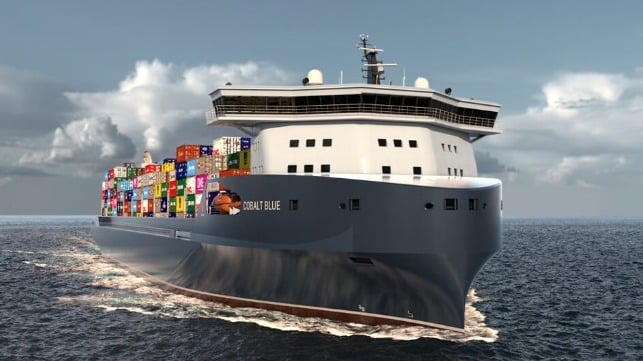Kongsberg Present Feeder Ship Designed for Alternative Fuel Transition

Kongsberg Maritime and Deltamarin have developed a new design for a feeder containership that they believe presents a critical migration path for shipowners to manage the coming transition in fuels while also providing other innovations to increase the efficiency of operations. Known as Cobalt Blue, they report the design has been reviewed by classification society DNV and received Approval in Principle.
“The container feeder market will need to go through fleet renewal in the coming years and owners will be carefully considering their options,” said Oskar Levander, Kongsberg Maritime’s SVP, Business Concepts. “With future emissions reductions in mind, future ships will have to include the use of alternative fuels and this design will enable owners to invest in a vessel that can evolve over time.”
At the core of the Cobalt Blue is a modular design which they believe will permit the vessel to be upgraded over time to transition through fuel types during the working life of the ship. With the ship’s modular design, the design team says there is room for adding future innovations. It can be built now with a dual-fuel main engine, that will run on LNG or diesel fuels. Then there is the possibility to switch to low-carbon fuels such as biogas, synthetic methane, or ammonia to reduce greenhouse gas emissions.
Levander explains the vessel can easily be reconfigured to accommodate the additional tanks required for alternative fuels. The design can provide room for battery containers to enable emission-free operation close to port.
Other elements of the design for the 2,000 TEU container feeder vessel include an open-top deck eliminating the need for heavy cargo hatches. The deckhouse is also positioned forward in a concept similar to Maersk which is also putting the accommodations block at the front of its next-generation ships. Kongsberg and Deltamarin explained that the forward deckhouse will help protect the cargo from green water coming onto the ship.

that matters most
Get the latest maritime news delivered to your inbox daily.
The range of Kongsberg equipment on the vessel can also extend to include propulsion and control systems and an active stabilizer system with intelligent weather routing and steering to minimize the risk of cargo loss.
According to the designers, the core concept aims are to offer shipowners a future-proof vessel that delivers efficiencies and sustainability benefits while preparing the sector for future developments to meet tighter emissions requirements.
